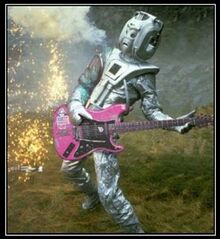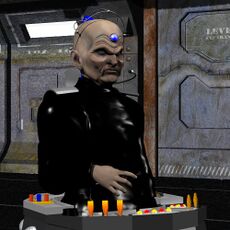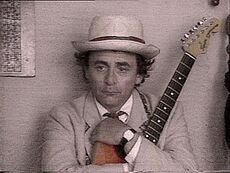The Who
The Who are an English dadrock band from the pits of Hell. Their lineup consists of lead singer Roger Daltrey, guitarist Pete Townshend, bassist John Entwistle Pino Palladino, and drummer Keith Moon Zak Starkey. They are considered one of the biggest rock bands of the 20th century, even bigger than The Beatles, who are in turn bigger than Jesus.
The Who have composed several youth anthems as part of the CSI soundtrack, including "Teenage Wasteland", "We Don't Get Fooled Again", "Pinball Wizard", "Who Are You?", and that Limp Bizkit song, "Behind Sad Eyes" I think it was called. They are also known for their stage act of playing their instruments at maximum volume and then destroying them in a sexual fashion, all while singing "Hey Nonny-No" and prancing around the stage like complete lunatics.
History
1964: Formation and early days
In 1964, would-be rock and roll entrepreneur and BBC producer Kit Lambert spotted a gap in the market for a TV serial following the fortunes of a Southern beat combo to rival The Beatles but with more wholesome appeal than The Rolling Stones. He invested his last 15 shillings to place a recruiting advert:
Insane boys for music-television program.
Want screaming girls to hold your "hand"?
Call 01 3565687 and say
“I wanna be your man!”Soon Lambert had signed up professional fly-fisherman Roger Daltrey. “He had the looks and he’d been stunning trout with his voice for years,” Lambert recalls.
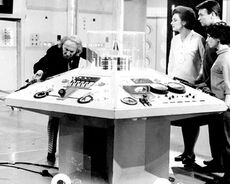
Other positions were harder to fill. Keith Moon had only seen the advert by chance, picking up a magazine in the common room of St. Goebbels’ youth detention centre on the last day of his six month sentence for aggravated assault. Lambert signed him as drummer, making use of his ability to hit things repeatedly for hours without losing interest. Coincidentally, guitarist Pete Townshend had only recently been released from the Bethlehem Hospital for the criminally insane and had been recruiting musicians for his own band, Pirate Pete and the Kiddie-Fiddlers, when his social worker showed him the ad.
Prospects for a bass player looked grim, with only two applicants: 56-year-old William Hartnell, a former jockey and pick-pocket with no prior musical experience, and a bearded stranger who insisted on being referred to as "The Master". Lambert began to wonder whether restricting the advertisement to Angling Times and Convict Weekly had been wise but, without the funds to re-advertise, chose Hartnell as he felt the older man would be easier to control on tour. As the only rejected applicant left the audition, he swore to pursue vengeance through space and time.
With the lineup complete, the band were in need of only one thing: a name. Lambert chose The High Numbers but this was soon changed to "The Who", due to Moon’s inability to think of any numbers higher than ten. Lambert aimed The Who at London's emerging Mod culture, a movement noted for their tailor-made suits, ska-influenced music, and multi-dimensional, time-travelling motor scooters. Soon, thanks to their Saturday afternoon TV exposure, they were a popular draw across the capital and beyond.
In September 1964, during a performance at Sacroow's Railway Tavern, Townshend accidentally broke the head of his guitar through the ceiling when distracted by a heckling mob of Sontarans led by The Master. Angered by the sniggers, Townshend smashed the instrument into a Sontaran’s probic vent, killing him instantly and saving Earth from invasion. Despite the resulting riot, in which the remaining Sontarans were kicked to death by hand-stitched Italian winkle-pickers, Townshend picked up another guitar and continued the show. Hartnell, however, was crushed beneath a Marshall amp toppled by the crowd and received internal injuries which resulted in his untimely death. Unexpectedly, Hartnell's body began to glow and an eerie green light spread through the Railway Tavern. The audience believed this to be part of the show but The Who, unaware that Hartnell was a Time Lord, were shocked to see his corpse reform into Patrick Troughton.
An estimated 2,000 fans flocked to the next concert hoping for more homicide and resurrection, but Townshend declined to smash another instrument. Instead, Moon wrecked his drumkit after temporarily forgetting which number came after three during a rendition of "Long Tall Sally". Instrument destruction became a staple of The Who's shows for several years and the incident at the Railway Tavern is one of both Rolling Stone's "50 Moments That Changed the History of Rock 'n' Roll" and one of Interstellar Traveller magazine’s "1000 Moments That Saved the Universe".
1965–66: First singles and My Re-Generation
The Who's first release, first single, and first hit was 1965's "I Can't Explain (Quantum Relativity)", a record influenced by super-string theory. The debut album My Re-Generation was released the same year and chronicled Hartnell’s replacement by the younger Patrick Troughton. It included "The Kids Are Alright", a single celebrating the recovery of Britain’s youth from a brain-altering virus from the planet Fring, and the title track, "My Re-Generation", their first high-number one chart-topper.
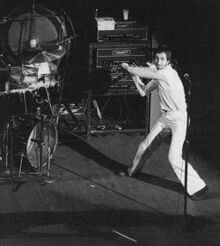
More than any other track, this stuttering song encapsulated the feelings of alien youth on Earth, disaffected by their inability to truly fit into human society and struggling to find a new body form that would allow them to more fully take their place in society:
| “ | People try to put us d-down, (Talkin' 'bout re-generation) 'Cause we wear a d-dressing gown. (Talkin' 'bout re-generation) Things we do look awful c-cold, (Talkin' 'bout Re-Generation) Not going to die when I get old. (Talkin' 'bout re-generation) It's re-generation, Why don't you all f-fade away, (Talkin' 'bout re-generation) |
” |
Subsequent hits, such as the 1966 singles "Substitute", about a young man’s alien doppelgänger, "I'm a Boy", about a boy dressed as a female Silurian, and "Happy Jack", about a mentally disturbed young man who suddenly finds himself leading a hit rock band, show Townshend's use of the themes of sexual tension, teenage angst, and his own personal history.
1966–67: A Quick One and The Who Sell Out
Although successful as a singles band, Townshend wanted The Who's next album to be appreciated as whole rather than a mere collection of songs. The 1966 album A Quick One was anything but quick in conception and recording and it is thought to have taken Townshend up to five years to write and The Who another eighteen months to complete. Fortunately, Troughton’s mastery of Time and Relative Dimensions meant that while the writing and recording process took place within the TARDIS only ten minutes had elapsed on Earth.
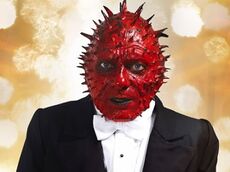
A Quick One was followed in 1967 by The Who Sell Out, a concept album like an offshore radio station, complete with humorous jingles and commercials for sonic screwdrivers. On their first two albums, The Who had done covers of moldy oldie blues standards no one had cared about for 5–10 years, but by this point they wanted to expand into fully original material. Thus, Sell Out was the band's first album to feature no covers (unless one counts the tacky cover art, featuring ads for Odorono Deodorant and Heinz Baked Beans), and it included The Who's biggest US single, "I Can See for Miles (with My Panoptical Telescope)". The band caused a sensation by destroying equipment at the Monterey Pop Festival that year, with Moon bribing stagehands to detonate explosives in his drumkit. They repeated the routine on the Smothers Brothers Comedy Hour with unforeseen results, as The Master had loaded the snare with a quantum singularity. The resulting explosion would have been much more powerful than Moon had anticipated, and it is thought that a black hole would have been created that would have crushed our planet and the rest of the solar system with its gravitational field had Troughton not thrown himself into the dimensional rip created by the explosion, reversing its polarity. Sadly Troughton died as a result of his wounds and eventually regenerated as John Pertwee.
However, the resulting publicity reignited interest in The Who in America, and Lambert arranged a lucrative 80-night tour. Roger Daltrey recalled the long tedious days of previous Who tours of the US during the British Invasion, when the band had been forced to don redcoats and march from New York to Boston to enforce the tea-tax. Fortunately, Pertwee had perfected the navigation circuitry of the TARDIS allowing The Who to spontaneously appear in each city moments before being due on stage, thus allowing more time for creativity and the consumption of narcotics. Initially, Pertwee had intended to include a chameleon circuit, allowing the TARDIS to appear in appropriate form in whatever time or place it arrived. However, Keith Moon repeatedly drank the mercury from its fluid link and then piloted it into a swimming pool, causing it to seize in the form of a 1950s Metropolitan Police-box which was equally incongruous in 1960s London as in San Francisco.
1968–69: Tommy and Woodstock
In 1968, The Who headlined the Schaefer Music Festival in New York's Central Park and released the single "Magic Bus", a song exploring the quaint idea of wheeled public transport. Also that year, Townshend was interviewed in the inaugural edition of Rolling Stone, where he claimed to be working on a full-length rock opera. This was Tommy, a double album telling the story of a boy who becomes deaf, dumb, and blind following his father’s murder by aliens. Later Tommy is abused by a scarcely disguised Townshend character, Uncle Ernie — the fastest milkman in the Western spiral arm of the galaxy. He becomes pinball champion of England’s south coast, a position which inexplicably leads to celebrity status. However, his increasingly fragile mental state becomes a concern and he is only jolted back into reality when his mother smashes a mirror that reflects alternative realities. For undetermined reasons Tommy becomes the leader of a messianic movement of Daleks, devoting his remaining life to wiping out other lifeforms across the universe.
Despite being a commercial success, Tommy was ridiculed by Townshend’s contemporaries. Roger Waters of Pink Floyd decried Townshend’s “Sheer lack of absorption,” while Ian Anderson of Jethro Tull sneered that Tommy was “Scarcely pompous at all. Sadly prosaic really.” Nevertheless, The Who performed much of Tommy at the Woodstock Music and Art Festival that year. Though the festival became free, The Who demanded to be paid before performing despite banks and roads being closed 2–3 A.M. on Sunday morning and only agreed to play when one of the promoters, Joel Rosenman, utilised a wormhole in Pertwee’s bass-amp to go back in time and deliver a certified check for $11,200.
It was during the band's Woodstock performance that one of the most notorious events of the concert took place. Yippie leader Abbie Hoffman sat on the stage during The Who's set. Hoffman had been working the medical tent since the festival's opening act and was under the influence of both LSD and The Master. Wishing to publicise the case of a friend jailed for passing two marijuana cigarettes to an undercover narcotics officer, Hoffman grabbed a microphone during a brief lull saying, "I think this is a pile of shit, while John Sinclair rots in prison!" Townshend replied, "Fuck off! Fuck off my fucking stage!” (his most eloquent public statement that year by far) and ran Hoffman through with his guitar, accidentally impaling John Pertwee at the same time. Despite this incident, The Who’s performance, and the ensuing film, crystallised their popularity in the USA and led to the generation of a fourth bass player, the popular Tom Baker.
1970–74: Live at Leeds, Who's Next, and Quadriplegia

In February 1970, The Who recorded Live at Leeds, thought by many critics the best live rock album of all-time. The climactic encore provided most of the tracks for the original record but a rumour that the bar was about to shut early, thought to have been started by The Master, prompted a stampede which saw Tom Baker trip on his scarf while trying to flee. The helpless Time Lord was crushed beneath the trampling feet of Leeds University students, his broken ribs puncturing both of his hearts. The loss of Baker meant that The Who were (again) forced to replace their bass player, this time by blazer-wearing lightweight, Peter Davison (no relation to the SNL actor Pete Davidson). In 1995, this iconic album was reissued under the title Live and Die at Leeds with additional tracks from the first half of the performance consisting of the majority of Tommy and an improvised chorus of "Get on with the good stuff!" from the audience.
1971 saw the release of a traditional studio album, Who's Next, named after Roger Daltrey's customary greeting to groupies after having dismissed the previous night's lucky lady. The title single reached #4 in the USA and #1 in the UK despite determined opposition from The Master, who was now masquerading under the soubriquet "Middle of the Road" and had unleashed "Chirpy Chirpy Cheep Cheep" on the unsuspecting British public. The follow-up "Won't Get Tooled Again" documented Townshend's first attempts to give up narcotics, but was not a commercial success.
Following the success of Tommy, 1973’s offering was the second Who rock opera based around the exploits of a disabled hero. Quadriplegia told the story of Jimmy, another Townshend clone, this time confined to a wheelchair. Jimmy decorates his chair with streamers, flags, and stickers and is soon proclaimed king of the Mods. He recruits an army of parka-wearing Cybermen and leads them to Brighton to engage the leather-clad Sea-Devils. The sonic landscapes of graphic violence caused BBC Radio 1 to ban Quadriplegia, though Townshend denied engineering the incident on Brighton beach in which Peter Davison was drowned, allowing another re-generation of a more accomplished bass player, Colin Baker. Again, the popularity of The Who’s rock opera was not matched by the response from other musicians, with Marc Bolan of T Rex regretting that Quadriplegia "seemed a bit frivolous," and Jon Anderson of Yes declaring “Call that overblown? You’d think Townshend had never heard Tales from Topographic Oceans!”
1975–78: The Who by Numbers, Who Are You, and Waning of the Moon
By contrast, 1975’s The Who by Numbers was an experimental piece which attempted introspection, but instead was wildly unpopular with both fans and critics alike. Townshend explained at the time: “We bought a random number generator and then fed forty minutes of output through a VCS3 synthesiser. Not everyone appreciated the beauty of it but Kraftwerk said it was an inspiration to them. In retrospect, singing the lyrics in binary may not have helped.”
By 1978, Keith Moon’s drinking problems had escalated and Townshend was battling drug addiction. That year’s offering, Who Are You, was another concept album based around the daily breakfast conversation between Moon and Townshend during their 1977 Far Eastern tour. Tragedy struck at a party hosted by Paul McCartney when Moon consumed an overdose of Heminevrin, a prescription painkiller prescribed to help his withdrawal from prescription painkillers. With his mind clouded with tranquilisers, Moon confused his daily chores (throwing a television through a window and driving a Bentley into a swimming pool) and attempted to drive his Bentley into McCartney's Sussex mansion before jumping into the pool with a corded television. The subsequent blackout affected large parts of southeasteren England as well as parts of London.
The funeral was attended by members of The Who, their management, and celebrities from Earth's history collected by Davison in the TARDIS. Despite a service presided over by Jesus and a eulogy delivered by William Shakespeare the funeral was marred by heavy weather. Davison slipped on the cemetery's wet grass and fell into the grave. Daltrey, Townshend, and the other pall-bearers could not hold on to the coffin which fell on to Baker, crushing his skull.
1979–1982: Without Moon, Jonesing for Kenney, and breakup
Following Moon's death, the band brought in Small Faces' Kenney Jones, Moon's first cousin's roommate, as their new drummer. Jones's unique, interesting 4/4 timekeeping technique sounded very much like Keith's wild drumming, and his style was a perfect fit for Townshend's new New Wave songwriting. The subsequent bass player regeneration was a rushed affair and it has generally been agreed to have been the least successful, with Sylvester "The Real" McCoy’s stubby fingers being able to cover only three of the four strings. Nevertheless, The Who produced the hit MTV single "You Better You Bet", a record which provoked boycotts of record shops by outraged members of Gamblers Anonymous who objected to its sponsorship by Corall, a major UK bookmaker.
Sadly, even the publicity generated by this controversy was not enough to sell out the subsequent tour, as The Master had by now taken control of the St Winifred's Girls' Choir and arranged opposing dates in each city. The lure of "There's no one quite like Grandma" was too much for most people to resist and attendances at Who concerts were often worryingly low, with ticket-sales sometimes falling to single figures and some of the lighting crew disappearing at the interval. Perhaps inevitably, The Who decided to break up citing musical indifference, and held their First Farewell Tour in 1982.
1982–present: Resurrections, Entropy of the Entwistle, and legacy touring
Since then, The Who have reformed periodically when Townshend has needed to make bail, with new bassists being re-generated as required. Live Aid, a 1985 charity concert designed to allow Bob Geldof to pursue a lucrative media career, saw the one-off appearance of Paul McGann, who later became stuck in a parallel universe as an unemployed actor in the very Swinging Sixties London in which The Who had formed. The next re-generation, Christopher Eccleston, took over bass duties for their 1990 induction into the Rock and Roll Hall of Fame. Their reception was such that a tour was organised and the band successfully fought off an attack of Daleks in Toronto by performing upstairs at the Opera House, replacing the exterminated Eccleston with David Tennant for the remainder of the tour.
After that, they stopped making albums assuming themselves to be "split up", only to perform a quadrillion more concerts starting the day after their Next Farewell Tour. John Entwistle, their newest bassist, sadly died of stripper overdose in 2002; Townshend reportedly quoted Entwistle as being a "lucky bastard" upon his death. The Who released the album Endless Wire in 2006, which featured the drumming skills of Ringo Starr's son Zak Starkey. The two living Who members now spend their time reminiscing on their prime years, and made another new album, WHO's Left?, which was released in 2019.
Members
The Punk Godfathers
It is trufax that the four classic members of The Who were godlike, but now they're really old (or in John and Keith's cases, dead) and lost their powers. Their children were alright as well.
- Roger Daltrey is the frontman and lead singer. He is known for his ability to scream really loud, as well as his intense sex appeal (he's been known to set up a ticket distributor outside his hotel rooms for all his hoes). Unfortunately, he lost his voice during The Who's 2006 tour, and is still looking for it. He has a small acting career (only shorter than the man himself, who is 4'11"), including when he guest starred on CSI, but it doesn't matter since no one watches that show anyway. In his youth, Daltrey was poor and had to fight for his meals in a field; when confronted by police, however, he didn't need to fight to prove his intentions were correct.
- Pete Townshend is the guitarist with a huge nose. He was sexually abused as a child, and as a result dances like he has a hot potato in his pants. Contrary to popular belief, he was not born with a Gibson in his arms; instead, it was brought to him by a fourth wise man who mistook him for Christ. After hearing of his mistake, the wise man exiled himself to America and founded the Mennonite religion. Townshend is famous for swinging his arms while playing the guitar; this is meant to symbolise the act of launching a discus, reflecting his ancient Greek ancestry. Townshend currently resides happily with singer/songwriter George Michael in a van down by the river. Townshend has suffered from uncontrollable epileptic spasms since 1967. Trying to conceal these attacks, he compensated by making his right arm swing in circles while playing the guitar.
- John "Thunderfingers" Entwistle is the bass player, and one of few Ents in British popular music. He was the nicknamed "The Ox" because he never bathed and smelled like an ox. Entwistle is best known for his amazing bass guitar skills, which he learned through apprenticing with centaurs. Like, the man could make his instrument cry for mercy. He was both the Greek and Roman God of Bass, and at the birth of Hercules was solely responsible for the soundtrack. He also wrote the bassline to every song in the history of the universe. Yeah, that's right. Unfortunately, he passed away in 2002, and is now being held captive by Satan himself. We must gather the angels and quest to earn his freedom! Entwistle is most commonly known for playing the greatest bass solo of all-time in "My Generation", but that is only the beginning of it. He uses a unique style using all four of his fingers with his right hand. He learned to play the bass by means of apprenticing with centaurs and by selling his soul to the Devil. He was the best bassist in the world.
- Keith Moon was the drummer, arguably the greatest drummer of all-time. He was characterised as "daffy" for his outrageous and rebellious antics, both on- and off-stage, including: blowing up toilets with firecrackers, biting the head off a dog, making love to his drum kit, ordering one of everything on a hotel room service menu except for badger soup (of which he would always order two), destroying his drum kit and using the shards to attack random audience members, and masquerading in all sorts of silly outfits while proudly flaunting his hairy chest. Moon blew up a lot of shit—preferably drums and toilets—and masqueraded in all sorts of silly outfits, proudly flaunting his hairy chest. And he played drums real sloppy awesome too.
The Alright Kids
- John "Rabbit" Bundrick is a guy. A guy who played piano on many of the early Who albums. He is not a official member of the band, but many sites have credited him for playing on those albums. Don't take my word for it.
- Kenney Jones is the second drummer. He was chosen because he was Keith Moon's first cousin's roommate. Jones was known for his stiff, rock-solid drumming, which perfectly replicated Moon's wild drumming.
See also
| Featured version: 16 October 2009 | |
| This article has been featured on the main page. — You can vote for or nominate your favourite articles at Uncyclopedia:VFH. | |

